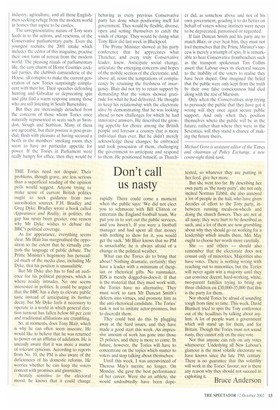Don't call us nasty
THE Tories need not despair. Their problems, though grave, are less serious than a superficial reading of the opinion polls would suggest. Anyone trying to make sense of current British politics ought to seek guidance from two unorthodox sources, EH. Bradley and Greg Dyke. Bradley wrote a book called Appearance and Reality; in politics, the gap has never been greater, one reason why Mr Dyke wishes to debase the BBC's political coverage.
As for appearance, everything seems clear. Mr Blair has marginalised the opposition to the extent that he virtually controls the language of public debate. The Prime Minister's hegemony has persuaded much of the media class, including Mr Dyke, that his position is unassailable.
But Mr Dyke also has to find an audience for his political purposes, which is where reality intrudes. No one seems interested in politics. It could be argued that the BBC has a duty to elevate public taste instead of anticipating its further decay, but Mr Dyke feels it necessary to operate in a world in which general election turnout has fallen below 60 per cent and traditional affiliations are crumbling.
So, at moments, does Tony Blair, which is why he can often seem insecure. He would like to believe that he was returned to power on an afflatus of adulation. He is uneasily aware that it was more a matter of tolerant cynicism. According to reports from No. 10, the PM is also aware of the deficiencies of his domestic reforms. He worries whether he can keep the voters content with promises and gimmickry.
Acutely sensitive to the electoral mood, he knows that it could change rapidly. There could come a moment when the public says: 'We did not elect you to schmooze with Bill Clinton or entertain the England football team. We put you in to sort out the public services, and you haven't. If you were a football manager and had spent all that money with nothing to show for it, you would get the sack.' Mr Blair knows that no PM is unsackable; he is always afraid of a change in the political weather.
What can the Tories do to bring that about? Nothing dramatic, certainly; they have a leader with a minimum of thespian or rhetorical gifts. No rainmaker, IDS is merely dogged-as-does-it. If that is the material that they must work with, the Tories have no alternative. They must work to turn Mr Duncan Smith's defects into virtues, and promote him as the anti-rhetorical candidate. The Tories' task is not to imitate actor-premiers, but to discredit them.
They could best do this by plugging away at the hard issues, and they have made a good start this week. An impressive amount of work has gone into those 25 policies, and there is more to come. In future, however, the Tories will have to concentrate on the topics which matter to voters and stop talking about themselves.
Until this week, I was unconvinced of Theresa May's merits; no longer. On Monday, she gave the best performance of her career. Were she an athlete, she would undoubtedly have been dope
tested, so whatever they are putting in her feed, give her more.
But she went too far. By describing her own party as 'the nasty party', she not only incited Norman Tebbit, she also annoyed a lot of people in the hall, who have given decades of effort to the Tory party, inbetween running meals-on-wheels and doing the church flowers. They are not at all nasty; they were hurt to be described as such, and a lot of them are now grumbling about why they should go on working for a leadership which insults them. Mrs May ought to choose her words more carefully.
She — and others — should also remember that the electorate does not consist only of minorities. Majorities also have votes. There is nothing wrong with reaching out to minorities, but the Tories will never again win a majority until they can convince decent, hard-working, white, two-parent families trying to bring up three children on £30.000-35,000 that this is the party for them.
Nor should Tories be afraid of sounding tough from time to time. This week, David Blunkett tried to spin the Tory conference out of the headlines by talking about asylum. A lot of people want a government which will stand up for them, and for Britain. Though the Tories must not sound nasty, they cannot rely on the nice vote.
Not that anyone can rely on any votes whatsoever. Underlying all New Labour's glamour is the most volatile electorate we have known since the late 19th century. There is no guarantee that this volatility will work in the Tories' favour; nor is there any reason why they should not succeed in
exploiting it. Bruce Anderson


































































































 Previous page
Previous page